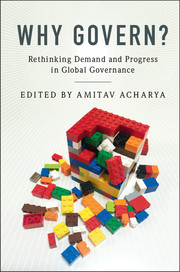Book contents
- Frontmatter
- Contents
- List of Figures
- List of Tables
- Notes on Contributors
- Acknowledgments
- List of Abbreviations
- 1 Rethinking Demand, Purpose and Progress in Global Governance: An Introduction
- Part I The Changing Concept of Global Governance
- Part II Issue Areas
- 5 Conflicts and Security
- 6 Human Rights
- 7 Atrocity Crimes
- 8 Trade
- 9 Finance
- 10 Climate
- 11 Refugees
- 12 Health
- 13 Cyberspace and Social Media
- 14 The Contested Quest for Global Governance: Conclusions and Directions for Further Research
- Bibliography
- Index
6 - Human Rights
from Part II - Issue Areas
Published online by Cambridge University Press: 05 September 2016
- Frontmatter
- Contents
- List of Figures
- List of Tables
- Notes on Contributors
- Acknowledgments
- List of Abbreviations
- 1 Rethinking Demand, Purpose and Progress in Global Governance: An Introduction
- Part I The Changing Concept of Global Governance
- Part II Issue Areas
- 5 Conflicts and Security
- 6 Human Rights
- 7 Atrocity Crimes
- 8 Trade
- 9 Finance
- 10 Climate
- 11 Refugees
- 12 Health
- 13 Cyberspace and Social Media
- 14 The Contested Quest for Global Governance: Conclusions and Directions for Further Research
- Bibliography
- Index
Summary
Introduction
The discipline of international relations is moving away from the study of “international relations” and toward the study of “global governance.” This volume's definition of global governance stresses the role of both formal and informal management of transnational issues by states, international institutions and non-state actors through power, cooperation, and law and norms. Such a definition is useful for an issue area like human rights, where diverse actors – including small states and non-state actors, often motivated by norms – have played a central role.
The issue of human rights is particularly relevant for the central topic of this volume: the demand for global governance. In many volumes about international relations, human rights are treated as yet another of the multiple issue areas that need to be regulated or governed, or even a “niche” issue compared to the core issues of security, trade and development. I will argue here that, far from being a niche area, human rights demands are one of the main answers to the question that animates this volume: “Why Govern?” Just as human rights demands were constitutive in each of the waves of emergence of new sovereign states, human rights issues have also been one of the key constitutive norms of the moves to regional and global forms of governance. I do not claim that human rights are the most important constitutive norms of global governance, but rather that they are one such key constitutive norm. There are some regional governance arrangements, like ASEAN, for example, where human rights norms were explicitly absent until 2010, and there are other global institutions, like the WTO, where attention to labor rights have been sidelined to other goals. But human rights norms have animated the demand for global governance well beyond the reach of specific human rights governance arrangements, including regional organizations in Europe, Latin America and Africa.
I argue that the demand for international human rights protections led to the emergence of specialized human rights governance arrangements, such as the Inter-American Commission on Human Rights (IACHR), the Inter-American Court of Human Rights and the International Criminal Court (ICC), but also helps explain more generally why actors seek and support global forms of governance.
- Type
- Chapter
- Information
- Why Govern?Rethinking Demand and Progress in Global Governance, pp. 121 - 137Publisher: Cambridge University PressPrint publication year: 2016
- 2
- Cited by



